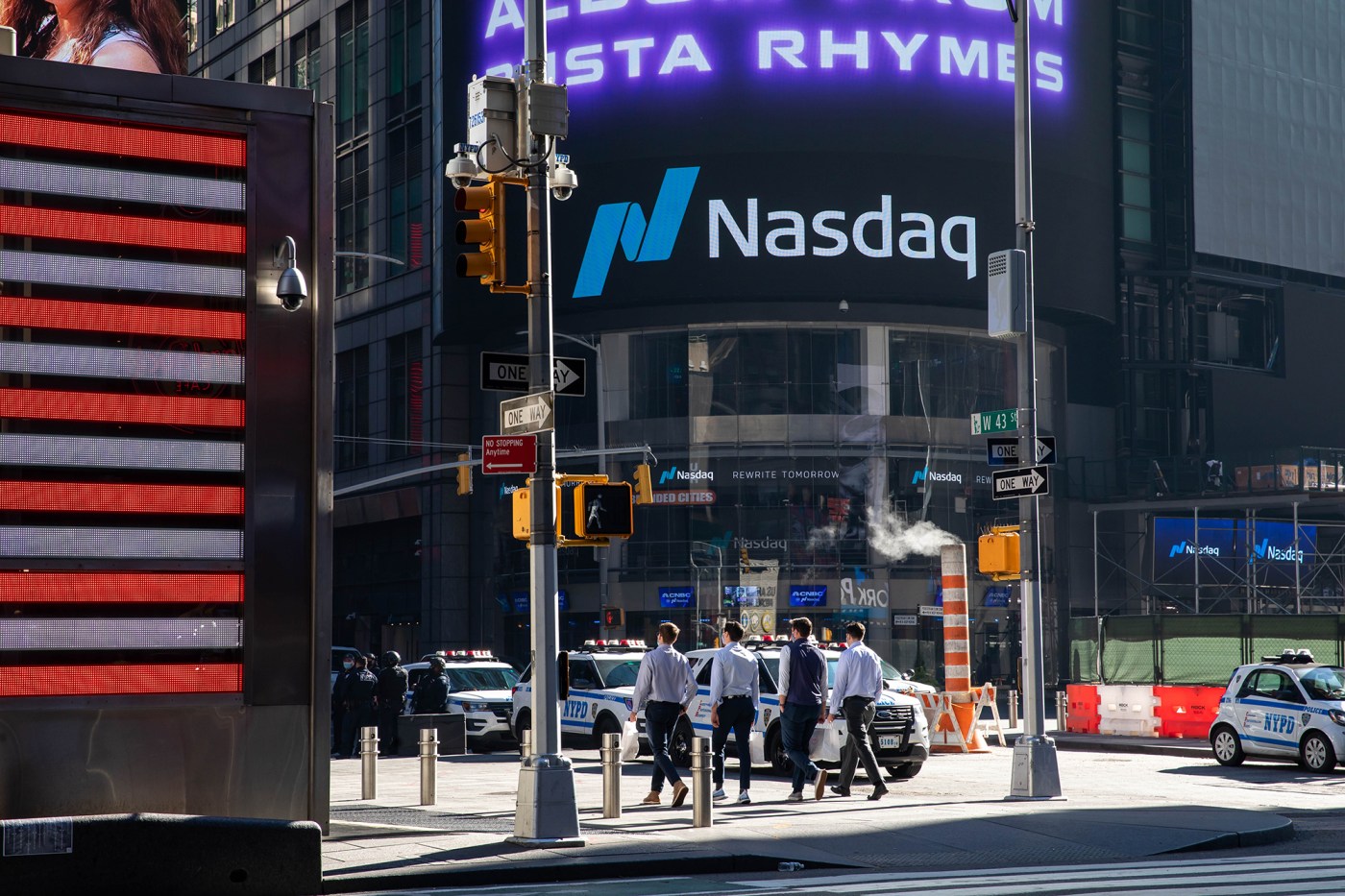
(Bloomberg/Katherine Doherty) — Nasdaq Inc. is asking regulators to let investors trade tokenized versions of stocks on its exchange, a move that could mark the first big test of blockchain technology inside the core of America’s equity markets.
The exchange operator is seeking approval from the US Securities and Exchange Commission to amend certain rules, including the definition of a security, that would allow stocks to be tokenized and traded on regulated venues like Nasdaq, according to a filing Monday. Any changes would have to be approved by the SEC and need to go through a comment period before implementation.
Nasdaq detailed ways it would trade tokenized securities in the filing seen by Bloomberg. The firm suggests shares of a tokenized security should trade on Nasdaq and other exchanges under the same rules of execution and documentation if it’s considered equal to and has the same shareholder rights as the underlying security.
Related Articles
Apple’s $450 billion rally faces scrutiny of product unveiling
Musk’s SpaceX to buy EchoStar Spectrum for $17 billion
Pope Leo XIV declares teen computer whiz Carlo Acutis the first millennial saint
YouTube using creators to enhance broadcast of the NFL game between the Chiefs and the Chargers
Google hit with $3.5 billion fine from European Union in ad-tech antitrust case
The company also proposes that tokenized assets are clearly labeled as such, so participants that want to clear and settle their trades and the Depository Trust Company that handles clearing and settlement will carry out the order, Nasdaq said in the filing. Nasdaq also said that tokenized assets will receive the same priority in which the exchange executes that order as it does with traditional assets.
The request goes beyond a technical rule change. It touches the foundations of how stocks are defined, issued and settled — questions that could decide whether tokenization stays on the edges of crypto or becomes embedded in the plumbing of Wall Street.
“The solution, which is detailed in the proposal, is simple, leverages the current infrastructure, and market structure,” Chief Financial Officer Sarah Youngwood said at the Barclays financial services conference on Monday.
If approved, US regulated exchanges could bring tokenized shares into their system, putting the technology behind cryptocurrencies in direct contact with some of the world’s most heavily traded equities. That experiment would help settle the raging debate about whether blockchain is set to overhaul market infrastructure – or remain a novel tool pushed by crypto-native firms.
Nasdaq’s move comes amid a broader push by more traditional finance firms into the digital assets industry and blockchain technology. That’s in direct response to a changing regulatory regime in Washington that’s more open to crypto innovation in the US markets.
Paul Atkins, the new chairman of the US Securities and Exchange Commission, is directing the regulator to develop clear guidelines for when digital assets qualify as a security. SEC Commissioner Hester Peirce said last month that the regulator is eager to work with tokenization companies, noting that it remains critical that they properly disclose the nature of the assets being tokenized.
Right now, a tokenized security is a digital representation of a security — but not direct title to the asset itself — that can be traded on a blockchain network, rather than in a brokerage account. They have been touted as a way to deepen liquidity, support fractional ownership and widen access for overseas investors in US stock markets.
Supporters of tokenization note that trading tokenized securities on blockchain technology would also support round-the-clock trading, unlike on traditional exchanges that shutter overnight and on holidays. That’s because, in theory, tokenized funds could offer near-instant settlement and disintermediate legacy infrastructure.
The concept of tokenization has been promoted heavily as one of the most viable use cases for blockchain, the distributed ledger technology that underpins most cryptocurrencies. BlackRock Inc., Franklin Templeton and KKR & Co. all have announced efforts to tokenize certain parts of their funds but use broker-dealers as intermediaries to do so.
Most tokenized shares have been issued by third parties and not by issuers themselves on traditional stock exchanges like Nasdaq. That’s caused some issues. Robinhood, for example, offered trading in OpenAI tokenized shares, but the artificial-intelligence company cautioned that it didn’t endorse such a product and the tokens aren’t company equity.
In its own filing with the SEC, Nasdaq raised its concerns over stock issuers who list their securities on exchange venues. “Nasdaq believes that tokenizing securities should not occur in a manner that deprives issuers of their ability to determine where and how their shares trade,” it wrote, noting that it is limited in its ability to give issuers the choice as to whether their shares are tokenized or not.
Wall Street behemoth JPMorgan Chase & Co. said in a recent note to clients that broad adoption in tokenizing bonds and other traditional assets hasn’t taken off and that much of the activity in the space is driven by crypto-forward firms rather than traditional banks, brokers and publicly-traded companies.
Others have called for a cautious and deliberate approach on tokenization. Trading behemoth Citadel Securities raised its concerns about the potential for regulatory arbitrage if the SEC doesn’t delineate clear rules for companies that want to tokenize assets to follow.
Nasdaq’s President Tal Cohen said the firm is looking to “bridge the gap between the digital-asset and traditional-asset worlds.” In a LinkedIn post, Cohen said “the challenge – and the responsibility – is to ensure that this transformation is grounded in investor-first principles.”
–With assistance from Lydia Beyoud.
(Updates with quotes from Nasdaq CFO and President in sixth and final paragragh)
More stories like this are available on bloomberg.com
©2025 Bloomberg L.P.